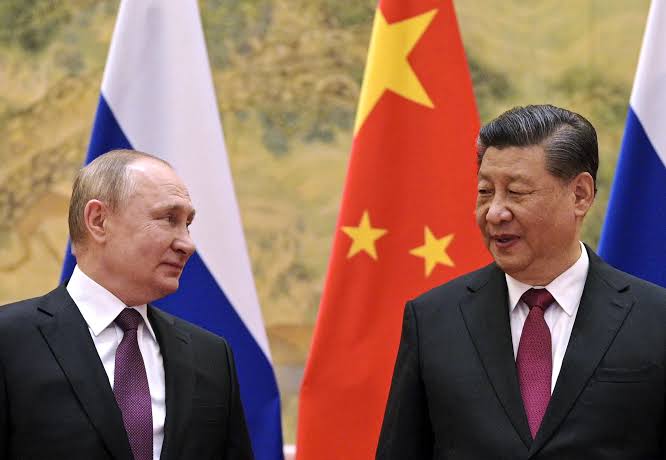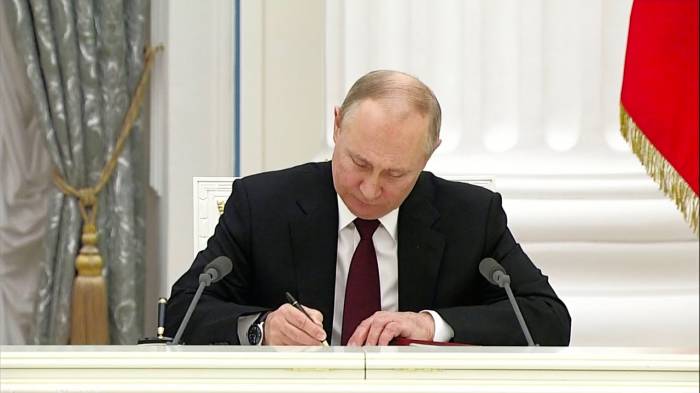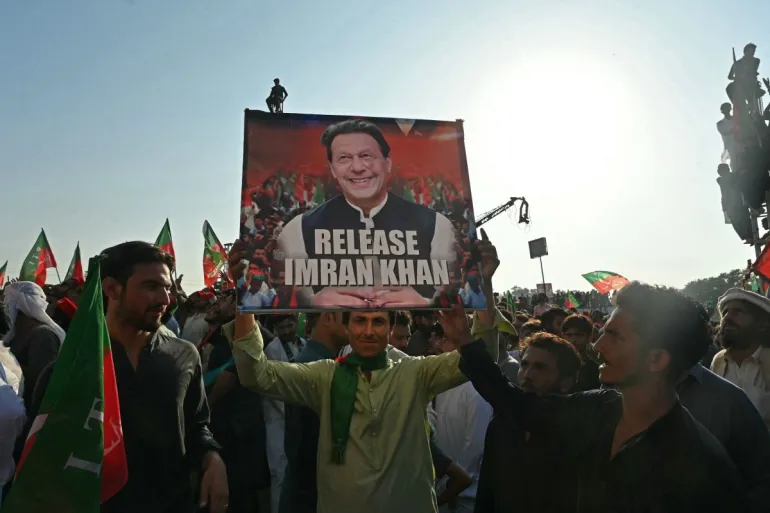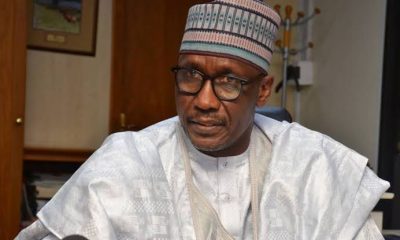Foreign
Ukraine War: How China stood by ‘no limits’ partner Russia

Ukraine War: How China stood by ‘no limits’ partner Russia
Nearly a year has passed since Russia invaded Ukraine, which came just weeks after Beijing and Moscow had declared a “no limits” partnership that sparked anxiety in the West.
Here are the implications for China as the war approaches its one-year anniversary on Feb. 24.
Beijing has provided diplomatic cover for Moscow, refraining from condemning its conduct or calling it an “invasion” – in line with the Kremlin, which describes the war as a “special military operation” designed to protect Russia’s own security.
RELATED STORY: Court adjourns FG, ASUU suit until March 28 for ruling
While China has repeatedly called for peace, President Xi Jinping has stood by his Russian counterpart Vladimir Putin, resisting Western pressure to isolate Moscow.
China has also stepped up trade with Russia, and in particular has been a willing buyer of Russian energy exports, providing a lifeline to Russia’s sanctions-battered economy.
China’s support for Russia has deeply damaged goodwill with the West, hampering Beijing’s efforts to drive a wedge between Brussels and Washington, analysts have said.
Russia’s move on Ukraine initially appears to have caught China on the back foot, with Putin not warning Xi of his invasion plans when he visited Beijing at the start of the Winter Olympics last year, diplomats have said.
The war has also put China in an awkward position since respecting the sovereignty and territorial integrity of all countries is a key plank of Beijing’s foreign policy.
The war has intensified Russia’s dependence on China, increasingly making Moscow the junior partner and strengthening Beijing’s leadership among emerging countries in opposition to the U.S.-led post-World War Two order, analysts have said.
“China is in it for self-interest, period. A weaker Russia is probably a Russia that can do more that serves their interests,” said Alexander Gabuev, senior fellow at the Carnegie Endowment for International Peace.
China has also lapped up imports of Russian crude oil priced below the global benchmark, with average daily crude oil imports from Russia increasing by about 45 per cent by value from the post-invasion period to December, Refinitiv data showed.
Beijing is concerned about an expansion of the U.S. security presence in the South China Sea.
By objecting to NATO expansion into what Russia considers its backyard, it sets the stage to object to further U.S. activity in China’s neighbourhood.
China has sought to avoid providing support to Russia that would invite sanctions upon itself, including refraining from providing weapons.
It has reacted angrily to U.S. Secretary of State Antony Blinken’s warning not to provide weapons to Russia.
Beijing has also sought to put some rhetorical distance between itself and Moscow to avoid irreparable damage to relations with the West, and used its influence with Moscow to urge Putin not to use nuclear weapons.
China is playing a more active public role after months of advocating peace talks without taking direct action.
Xi is expected to deliver a “peace speech” on Friday, the anniversary of the invasion, and China will publish a position paper on the Ukraine conflict outlining its stance.
“With Russia’s failure on the battlefield, the chance is ripening for talks, in China’s view,” said Yun Sun, senior fellow at the Stimson Center in Washington, D.C.
The appearance of shuttle diplomacy by Wang Yi, and the upcoming speech by Xi on this topic, alludes to this direction,” she said, referring to the visit this week to Moscow by China’s top diplomat after he met Blinken and other western officials during an ongoing trip to Europe.
Beijing has repeatedly opposed any linkage between the Ukraine war and its intentions to “reunify” with the self-ruled island that it claims as its territory.
Chinese foreign minister Qin Gang on Tuesday urged “some countries” to “stop hyping up ‘today Ukraine, tomorrow Taiwan’,” in an apparent dig at the United States.
But many experts have said that China is no doubt taking into account Russia’s military setbacks in Ukraine, as well as the response of other countries, as it weighs its long-term thinking towards democratically ruled Taiwan, which it has vowed to take control of, by force if necessary.
The result and the cost of the war show the Chinese that an invasion is Taiwan may not be prudent,” said Sun.
“It doesn’t mean they will refrain from it if Taiwan declares independence.
“But the chance of them taking the initiative is smaller.”
Ukraine War: How China stood by ‘no limits’ partner Russia
Breaking News
Putin Signs Decree to Boost Russian Armed Forces Personnel by 180,000

Putin Signs Decree to Boost Russian Armed Forces Personnel by 180,000
Russian President Vladimir Putin has signed a decree to increase the staffing levels of the country’s armed forces, raising the total number of personnel to 2.38 million, including 1.5 million military personnel. The decree, published on the government portal, represents an increase of 180,000 personnel across the Russian armed forces.
The new staffing levels, set to take effect on December 1, 2024, reflect Russia’s ongoing efforts to strengthen its military amid global tensions and geopolitical challenges. This adjustment marks a rise from the previous staffing levels of 2.2 million, which included 1.32 million military personnel.
The decree is part of a broader strategy to enhance the country’s defense capabilities as Russia continues to prioritize military readiness.
Foreign
Pakistan Police Arrest Key Lawmakers from Imran Khan’s Party Amid Ongoing Crackdown

Pakistan Police Arrest Key Lawmakers from Imran Khan’s Party Amid Ongoing Crackdown
Authorities in Pakistan have arrested several prominent lawmakers and leaders from the Pakistan Tehreek-e-Insaf (PTI), the political party of former Prime Minister Imran Khan. Party officials confirmed the arrests on Tuesday following a series of late-night raids in Islamabad. While a police spokesperson stated that four individuals were detained, PTI officials claim that 13 members were arrested from various locations, including outside the parliament.
The arrests come in the aftermath of a large PTI rally held on Sunday, calling for the release of the 71-year-old former cricketer-turned-politician, who has been in jail for over a year. Among those arrested was PTI president Gohar Khan. The crackdown reflects ongoing tensions since Khan’s ousting as prime minister in 2022, following a fallout with military leaders, who often hold significant influence in Pakistan’s political landscape.
Footage broadcasted by local media showed police officers forcibly detaining lawmakers outside parliament, prompting condemnation from opposition leaders. Omar Ayub Khan, a senior opposition figure, described the arrests as “despicable,” while PTI spokesperson Zulfikar Bukhari denounced the detentions as illegal in a post on X, formerly known as Twitter.
Bukhari further reported that senior PTI members Shoaib Shaheen and Sher Afzal Marwat were also among those taken into custody. Despite a strong showing in February’s general election, where PTI-backed candidates secured the most seats, the party was unable to form a government due to a coalition led by Prime Minister Shehbaz Sharif.
Foreign
Iraq Denies Allegations of Smuggling Oil to Iran

Iraq Denies Allegations of Smuggling Oil to Iran
The Iraqi Oil Ministry has strongly refuted allegations made by several U.S. Congress members, who claimed that Iraq is smuggling oil to Iran to help the country bypass U.S. sanctions. The ministry labeled these accusations as “fabrications with no foundation.”
The rebuttal comes in response to a letter reportedly sent by five U.S. lawmakers to President Joe Biden, accusing Iraqi officials, including Oil Minister Hayan Abdul Ghani, of facilitating illegal oil sales to Iran. The letter further urged Biden to block Ghani’s planned visit to Washington until an investigation into the matter is completed.
In a statement, the Iraqi Oil Ministry expressed “astonishment and condemnation” at the allegations, stressing that its oil operations are under the scrutiny of international inspectors. The ministry also pointed out that Iraqi waters are strictly monitored by naval forces to prevent any illegal activity.
-

 Health5 months ago
Health5 months agoOnly 58,000 doctors renewed licence out of 130,000 registered doctors – MDCN
-

 Business1 year ago
Business1 year agoNew Rates: ‘I borrowed money to finance this business…’ – Petroleum Marketer cries out over Non-supply of products by the NNPCL
-

 Entertainment2 months ago
Entertainment2 months agoBBNaija Season 9: TAMI Duo Evicted After Low Vote Count
-

 Defence & Security1 month ago
Defence & Security1 month agoOrganisers Demand IGP’s Dismissal Over Fatal Protest Crackdown
-

 Defence & Security1 month ago
Defence & Security1 month ago“Defence Chief Praises Strong Inter-Service Cooperation for Operational Successes”
-

 Business2 years ago
Business2 years agoNew Naira Notes: We Have No Information On The Supreme Court Ruling – CBN
-

 Weather2 months ago
Weather2 months agoNiMet Forecasts 3 Days Thunderstorms, Rain Nationwide
-

 National1 month ago
National1 month agoNNPCL CEO Kyari Promises to Reveal Truth Amid Economic Sabotage Allegations


